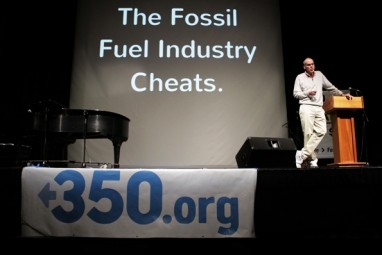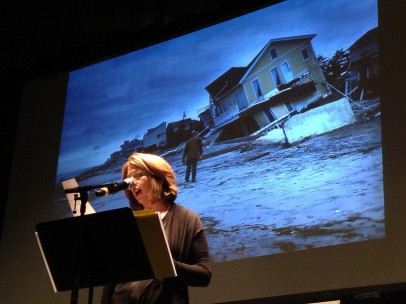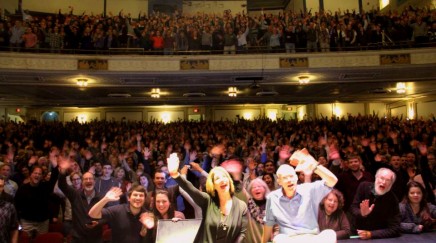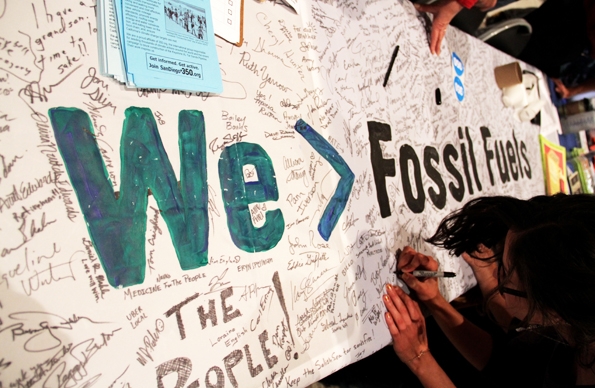If Bill McKibben ever gets tired of the author/activist life, he should consider becoming a math teacher. I’ve certainly never seen anyone else create as much interest as he has in three simple integers.
This past July, McKibben introduced the world to these three numbers in an article in Rolling Stone. A few days after the issue’s publication, “Global Warming’s Terrifying New Math” already had ten times as many hits as the cover story on Justin Bieber. This past month, McKibben has been traveling the country with 350.org to spread the word further via a 21-city Do the Math tour. Most nights, he’s been presenting the new climate math to hundreds and even thousands of university students, local activists, and everyday people concerned about the future. And most every night, his event venues have been sold out.
What’s so compelling about McKibben’s math? What about his presentation motivated me to take a bus 2.5 hours to Boston to see it, when I would’ve gone to similar lengths to get out of math class for most of my student career? Well, unlike high school calculus, McKibben’s numbers have a story behind them. His math is real, personal, and pressing.
The climate math is three simple numbers:
- 2 degrees Celsius—the amount of warming our planet can likely sustain before it reaches unsafe levels
- 595 gigatons—the amount of carbon we can emit into the atmosphere without surpassing the 2 degree limit
- 2,795 gigatons—the amount of carbon currently in the ground as oil, coal, and gas that fossil fuel companies intend to burn
As McKibben noted, the important calculation here is 2,795 divided by 595 equals 4.7. The fossil fuel industry intends to burn almost five times as much carbon as is “safe” for our planet and our species. As a result, the Do the Math show centered on the damages caused by the fossil fuel industry and the structures that allow fossil fuel companies to make unprecedented profits while destroying the planet.

Instead of paying to for the waste they emit, fossil fuel companies reap big profits while individuals pay the costs of climate change and pollution. (Image credit: Ryan Suffern via Rolling Stone)
“The Fossil Fuel Industry Cheats.” So read the enormous projection behind McKibben as he explained how fossil fuel companies, alone among individuals and industries, don’t have to pay for the messes they create. “Here’s the bottom line: the fossil fuel industry gets away with running our planet because of their money. They make so much of it because, in a word, they cheat – they don’t pay for producing the most dangerous pollution the planet has ever seen.” Instead, the costs of carbon emissions get foisted off onto us. We experienced them this year as pollution, severe drought, record wildfires, intense heat waves, and the recent destruction of Hurricane Sandy.
But McKibben was careful to point out that it’s not just us—the first world consumers supporting the fossil fuel industry—who are paying a high price. He showed a striking series of photographs from communities around the world that are being hit hard by climate change despite doing little or nothing to add to it. We saw a photo of residents of the Marshall Islands, an atoll nation already experiencing permanent flooding from sea level rise, taken underwater to show their support for climate action. We saw a photo of kids in India playing behind the dam in their community that is now so dry it holds no water. And, perhaps most poignantly, we saw a photo of children in Haiti standing in a flooded street holding posters that read, “Your actions affect me.” Sadly, as McKibben pointed out, the same is not true in reverse. Climate change is as much a moral fight as it is an environmental one.
In fact, in a video appearance taped especially for the event, South Africa’s Desmond Tutu declared climate change the biggest and most important moral fight of our time. He and guest presenter Naomi Klein both compared the climate struggle with the fight to end Apartheid in South Africa twenty years ago: both involve large and entrenched powers that beget and perpetuate immoral social inequalities.
Klein, who worked as an activist twenty years ago during the campaigns against the Apartheid government, stated, “The fossil fuel companies have behaved as if they are at war. Because they are. We really do want an end to their business model. Not because we hate them. Because our survival depends on it.”
But how can we end the fossil fuel industry’s business model? According to McKibben and Klein, our best bet may be to aim for the wallets of companies like Exxon, Chevron, and BP. During the Apartheid struggle, strong and systematic divestment from South Africa’s economy was a powerful motivator in ending its institutionalized racism. By divesting our money from the fossil fuel industry, McKibben, Klein, and the 350.org team believe we can put enough pressure on their business to require real change.

Naomi Klein spoke about the dangers of climate change and her personal experiences in New York and New Jersey in the wake of Hurricane Sandy. (Image credit: 350.org)
“We think it’s time for the fossil fuel industry to lose their license—their veneer of respectability,” McKibben told the audience. He called on each of us to step up and do our part in “this most important of fights.” It will eventually require us to divest our personal money, our churches, our businesses, our politicians, and our governments, but McKibben thinks one of the most powerful places to start is our schools. He asked the students in the audience—which included representatives from Harvard, Tufts, Wellesley, Brandeis, Boston University, Boston College, Suffolk, and Northeastern among others—to petition their school administrations to divest. He asked any alumni in the audience to do the same. Professors too. Tenured professors? Even better.
“There is nothing radical about wanting the same planet today as we’ve had all Holocene,” McKibben declared. “What’s radical is the fossil fuel companies deciding they’re actually going to change the chemical composition of our atmosphere.”
We have alternatives to fossil fuels. McKibben described how Germany is already blowing past its clean energy goals with technologies like wind and solar. “It’s a matter of will, not ability,” he explained. As soon as we decide collectively that we’re willing to fight for a clean energy future, we can have it. He was clear that it wouldn’t be an easy struggle, but that it’s a possible one if we all push together. And after reflecting on the magnificence of our world and the natural wonders he had seen just these past few weeks while on tour—the immense trees in California’s redwood forests, the stunning rocky coasts of the Pacific, and the hazy gray beauty of the New England mountains—McKibben concluded that fighting to maintain that beauty was the only reasonable thing to do.
He left us, newly full of inspiration and purpose, with one final piece of math that night: an inequality, but weighted in our favor.
We > Fossil Fuels.
“It may be the hardest thing we ever do, but I like our odds,” McKibben finished.
For more information on Bill McKibben and how you can get involved in the climate fight, visit 350.org. Check out gofossilfree.org to learn about divesting from the fossil fuel industry.









